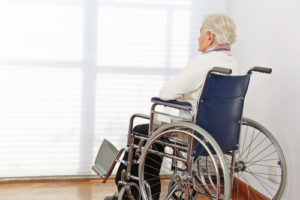Malnutrition and Elder Abuse in Nursing Home Facilities
May 2, 2020

According to the National Institutes of Health (NIH) and the National Center on Elder Abuse (NCEA), nearly 2 million American seniors need the assistance of a nursing home or other long-term care facility. Sadly, some of these patients will suffer abuse or neglect at the hands of their caregivers, classified under the umbrella term as elder abuse. Statistics show that at least 1 out of 10 adults over the age of 65 will suffer from at least one type of abuse every year, with one being a lack of proper sustenance, also known as malnutrition. Here is how malnutrition is defined as an abuse term and what warning signs to look for in elderly loved ones.
What is Malnutrition?
Malnutrition is defined as getting too much or too little of the nutrients needed to maintain a healthy body. While most people may think of someone being deprived of food as malnutrition, it is actually a more complicated issue. A care facility may be feeding their residents too little or infrequently, or only serving foods with empty calories that fail to provide the necessary proteins and micronutrients their bodies need to run properly. A diet of chips and candy, for example, is not as conducive to a healthy mind and body than properly balanced meals with fruits, vegetables, healthy carbs, and protein.
Why Does Malnutrition Happen?
So how do elderly patients become malnourished? We now know that it isn’t as simple as refusing to feed someone, or taking away their meals. While that may indeed happen, there are other ways that seniors can suffer from this state. If a patient is suffering from a dental issue that causes pain and prevents them from eating certain foods, they may slowly become deficient in certain areas. The same goes for other health issues. If they are taking medications that suppress their appetite or prevent nutrient absorption, they may unintentionally fall into a malnourished state.
What are the Signs of Malnutrition?
The obvious signs of malnutrition are of course weight loss, hair loss, weakness, and changes in skin color and nail color. Malnutrition can also cause serious dental deterioration, so if a loved one’s normally healthy teeth and gums become diseased, it might be from a lack of proper nutrients. You may also see malnutrition in an elderly person’s behaviors. If the patient has problems forming words or stringing thoughts together (with no underlying diagnosis like dementia or Alzheimer’s disease), it may be a good idea to take a look at what they are eating and how often.
See Something, Say Something!
If you are worried that a family member is suffering from a nutrition problem, don’t be afraid to ask questions. Ask the staff for details on the daily or weekly menu, which should be balanced and fill their nutrition needs. And if the staff or management refuses to cooperate, you are entitled to report them to the proper governmental body and file a lawsuit for neglect/abuse. We entrust our loved ones to these facilities and expect them to be well cared for, so if abuse is taking place, you have the right to hold them liable for your loved one’s injuries and harms.
Contact a New Jersey Nursing Home Abuse Lawyer to Discuss Your Case Today!
Seniors in nursing homes and other care facilities deserve to be treated with respect and dignity. Additionally, nursing home staff needs to ensure that patients are safe and secure at all times. If your loved one suffered an injury, or worse, due to nursing home negligence in New Jersey, you need to speak with a qualified attorney. At Rudnick, Addonizio, Pappa & Casazza we represent clients in nursing home abuse lawsuits in Monmouth County, Middlesex County, Mercer County and Ocean County, including Hazlet, Middletown, Red Bank, Matawan and Marlboro. Call 866-567-0135 or fill out our online contact form to schedule a consultation about your case. We have an office conveniently located at in East Brunswick at 197 State Route 18 South Suite 3000, East Brunswick, NJ 08816, and one at Park Village, 25 Village Court Highway #35, Hazlet, NJ 07730.
The articles on this blog are for informative purposes only and are no substitute for legal advice or an attorney-client relationship. If you are seeking legal advice, please contact our law firm directly.






